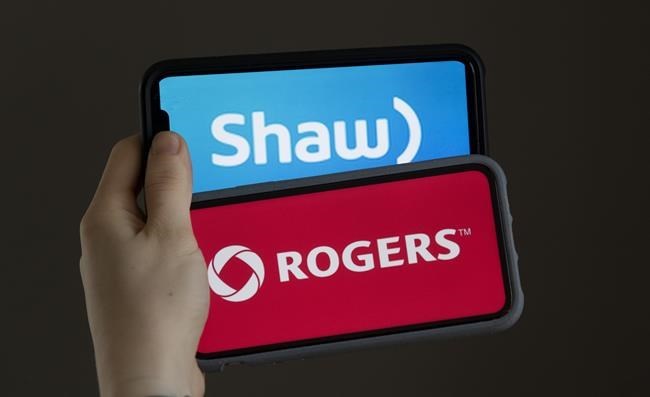The Canadian Radio-television and Telecommunications Commission has approved Rogers Communications Inc.’s acquisition of Shaw Communications Inc.'s broadcasting services, but will force the company to meet a series of conditions it laid out Thursday.
The approval from the broadcasting regulator is one of several hurdles Rogers must clear as it tries to close the $26-billion deal it signed in March 2021 that will see it acquire 16 cable services based in Western Canada, a national satellite television service and other broadcast and television services.
The Competition Bureau and Innovation, Science and Economic Development Canada are also reviewing the deal.
"The commission is of the view that the application, subject to the modifications ... is the best possible proposal given the circumstances and that this transaction would not diminish the diversity of voices in Canada," the report reads.
It also says the CRTC found that the competitive landscape would not be unduly affected and that the transaction would be in the public interest.
The CRTC, which was only tasked with assessing broadcasting elements of the transaction, said it made stipulations part of its approval because it wants to ensure that the sale will benefit Canadians and the country's broadcasting system.
In separate statements Thursday evening Rogers and Shaw welcomed the CRTC approval.
“This approval is an important milestone and brings us one step closer to completing our transformational transaction with Shaw,” said Tony Staffieri, Rogers' president and chief executive, in a statement.
Among the CRTC's conditions are a requirement forcing Rogers to contribute $27.2 million to various initiatives and funds, which is five times what the company had originally proposed.
The CRTC's decision said 80 per cent of that sum will be directed to the Canada Media Fund, the Independent Local News Fund and certified independent production funds. The remaining 20 per cent will go toward initiatives proposed by Rogers, including the Broadcasting Accessibility Fund and Broadcasting Participation Fund.
Rogers must create an Indigenous news team with journalists in all provinces where the company provides news content to deliver stories to First Nations, Métis and Inuit communities.
The company must also report annually on its commitments to increase its support for local news, including by employing a higher number of journalists at its Citytv stations and by producing an additional 48 news specials in prime time each year that reflect local communities.
The CRTC will force Rogers to distribute at least 45 independent English and French-language services on each of its cable and satellite services to ensure independent programming services are not placed at a disadvantage when negotiating with Rogers.
Shaw's home telephone, wireless and internet services that Rogers would acquire under the deal are not subject to CRTC approval, but are being reviewed by the Competition Bureau and Innovation, Science and Economic Development Canada.
The deal has faced opposition from competitors and government officials. Ottawa pledged to block the full transfer of Shaw’s wireless licences to Rogers and the House of Commons industry and technology committee said earlier this month that Rogers' bid for Shaw should not go ahead, but if it does, the government should place conditions on the deal.
The committee recommended the affordability and accessibility interests of Canadians should take precedence over all other considerations during the regulatory review process.
The CRTC said it received 365 interventions on the deal. About 334 were in support of the application, 25 were comments on the transaction and six were opposed to the deal.
Rivals Telus Corp. and BCE Inc. have also argued competition and consumer choice will be diminished, if the transaction proceeds.
Vancouver-based Telus has said that if merger goes ahead, Rogers would serve about 47 per cent of English-language broadcast subscribers and its network would reach 80 per cent of Canadians.
Tara Deschamps, The Canadian Press

